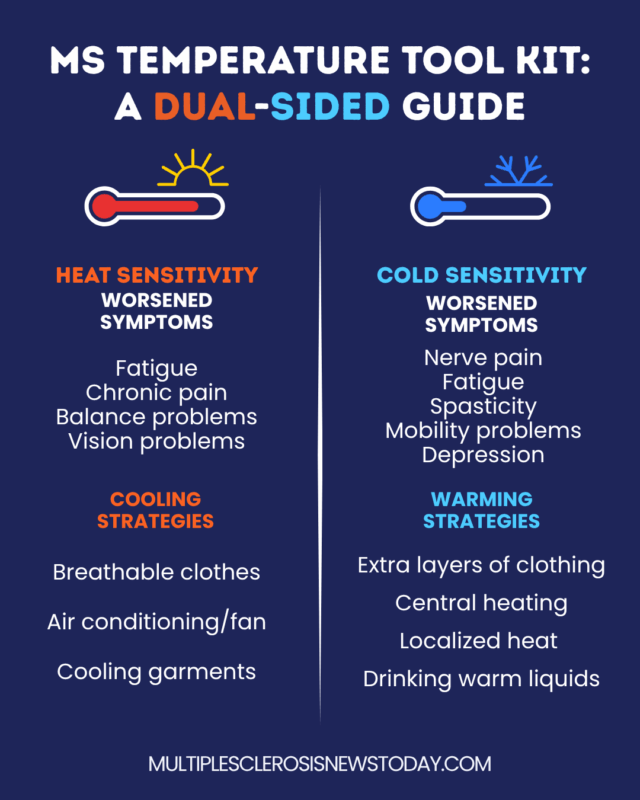
Temperature sensitivity in MS: Strategies for daily comfort
Last updated Aug. 1, 2025, by Jordan Wold

If you live with multiple sclerosis (MS), you might notice that your symptoms increase with sudden or extreme changes in temperature; this may be due to temperature sensitivity.
Understanding how temperature sensitivity affects you and learning practical tips for temperature regulation with MS can help you gain skills to manage any symptoms that may arise during the hotter or colder months.
Understanding temperature sensitivity in MS
There are several possible reasons why temperature sensitivity may cause an increase in your MS symptoms. For instance, damaged nerves may conduct electrical signals less efficiently at higher temperatures, which can temporarily exacerbate symptoms.
Because MS affects everyone differently, depending on where nerve damage occurs and which symptoms you experience, your experience with temperature sensitivity may not be the same as someone else’s.
A worsening of MS symptoms in cold weather, for example, may not be quite as common as heat sensitivity, but it might still impact you.
Heat sensitivity
Heat sensitivity in MS can exacerbate your symptoms and create everyday challenges.
Learning adaptive strategies for MS temperature regulation and observing common symptoms can help you gain valuable tips for living with MS in summer and provide practical ways to stay cool.
Everyday challenges
Although MS is different for everyone, there are some common symptoms that may worsen with increased temperatures. These can include:
- fatigue
- chronic pain
- balance problems
- vision problems.
Practical ways to stay cool
Managing heat sensitivity in MS may require making a few lifestyle changes, but finding ways to stay cool can help keep you comfortable. Some tips for living with MS in summer and managing heat sensitivity can include:
- dressing for the heat, as keeping your wardrobe light and breathable when temperatures are hotter may help avoid overheating
- maintaining a cool temperature inside your home with an air conditioner or fan, which may help you stay cool even when it’s hot outside
- wearing MS-friendly cooling products, such as cooling garments, which may improve physical function, even in warm temperatures.
While this list is not exhaustive, one or more of these cooling methods might provide some relief from symptoms and discomfort caused by MS and heat sensitivity.
Cold sensitivity
While heat sensitivity may be more common, cold intolerance is also often reported in MS. If cold weather and worsening MS symptoms go hand-in-hand in your life, cold sensitivity could be behind it.
Common experiences
You should check with your doctor before coming to any conclusions about how cold weather and your MS symptoms might be related. Still, there are some signs you can look for that may indicate a relationship between your MS and cold intolerance.
Some possible signs may include:
- nerve pain
- fatigue
- spasticity (muscle tightness and spasms)
- mobility problems
- depression.
Simple strategies for staying warm with MS
Consider implementing a few of these simple, adaptive strategies for MS symptoms to keep yourself warm and manage the effects of cold sensitivity.
- Try to heat yourself up by wearing a couple of extra layers, and if you start to get too warm, you can always take a layer off.
- If you have central heating and cooling, you can set your home’s temperature to a degree where you feel well-regulated.
- Consider alternate localized heating sources like heated water bottles or a heating pad.
- Stay hydrated by drinking warm liquids so that your body and brain continue to get what they need to function, even as you try to warm up.
Other MS and winter tips include being prepared for how cold weather and the unpredictable nature of MS symptoms can make it harder for your body to regulate temperature and cope with daily challenges.
For example, if you drive, you may want to let your car safely warm up before driving. You should also keep a winter survival kit in your car in case of an emergency.

Balance social and work needs
Life with MS can be rich and full, and many people continue to nurture relationships with friends and family, pursue a fulfilling career, and stay active in their communities.
But it can be challenging to effectively communicate your needs in these social and professional contexts.
Still, it’s important to communicate temperature sensitivities where possible. Managing MS symptoms in hot weather or staying warm with MS can be difficult enough.
Advocating for temperature accommodations in the workplace, like setting the air conditioning below a certain temperature or allowing for remote work during extreme weather, lets you focus your energies on your work.
Similarly, try to plan social engagements in environments that work for you. If an upcoming beach party sounds like a recipe for a symptom flare-up, ask if the event can be relocated somewhere you’re comfortable attending or if there will be cooling areas on-site.
Even if it’s uncomfortable at first, it’s worth communicating what you need to the people who care about you most.
Create a comfortable home environment
Preventive measures for temperature sensitivity in MS, and climate adaptation skills, can be utilized as much as possible when outside the home; but your home is the perfect place to create a comfortable environment where you can get the rest you deserve.
There are some steps you can take to make your home as comfortable as possible, including:
- implementing smart home devices to monitor and control indoor temperatures
- ensuring proper insulation and ventilation to maintain a comfortable living space
- creating designated cool or warm zones within the home for relief during temperature extremes.
When to get professional guidance
If temperature sensitivity is affecting your quality of life, consider consulting your healthcare provider.
Whether MS and heat sensitivity are impeding your ability to attend outdoor gatherings or having MS and cold intolerance makes it difficult for you to thrive in the winter months, your quality of life matters.
Seeing a medical professional can allow you to update your care plan or develop a new, personalized strategy for managing MS and body temperature control. Getting professional guidance can help you continue or get back to living your life to the fullest.
Multiple Sclerosis News Today is strictly a news and information website about the disease. It does not provide medical advice, diagnosis, or treatment. This content is not intended to be a substitute for professional medical advice, diagnosis, or treatment. Always seek the advice of your physician or other qualified health provider with any questions you may have regarding a medical condition. Never disregard professional medical advice or delay in seeking it because of something you have read on this website.




